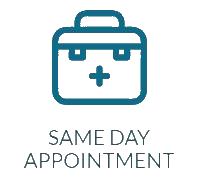Website built by:
SLEEP DISORDERS TREATMENTS IN MANHATTAN

What Are Sleep Disorders?
Sleep disorders are a group of conditions that affect the ability to sleep well on a regular basis. Most individuals occasionally experience sleeping problems due to stress or other outside influences. However, when these issues occur on a regular basis and interfere with daily life, it may be an indication of a sleep disorder.
How Does Poor Sleep Affect Your Health?
Sleep is vital for optimal health. The quantity and quality of the sleep you get will affect many different aspects of your life including your mood, behavior, productivity and overall health. Lack of sleep has been linked to an increased risk of cardiovascular problems, decreased memory, increased stress, weight gain, depression and an overall decrease in quality of life.

Symptoms Of A Sleep Disorder
Symptoms of sleep disorders differ depending on the severity and type of sleep disorder. However, general symptoms of sleep disorders may include:
- Difficulty falling or staying asleep
- Excessive daytime sleepiness
- Needing to nap during the day
- Irritability or anxiety
- Lack of concentration
- Depression
Diagnosing Sleep Disorders
Our physicians can perform a wide range of tests to diagnose certain types of sleep disorders. Diagnosis will always begin with a comprehensive medical history and physical exam. Other diagnostic tools include tests such as:
- Polysomnography (sleep study) – this type of sleep disorder test can evaluate factors such as oxygen levels, body movements, and brain waves as you sleep
- Electroencephalogram – a test that assesses electrical activity in the brain and detects any potential problems associated with this activity
- Genetic blood testing – blood tests can be used to diagnose narcolepsy and other underlying health conditions that may be causing sleeping disorders
Types Of Sleep Disorders
There are numerous types of sleep disorders we treat at Park Avenue Medical Professionals. A few of the common ones include:
Insomnia
Insomnia refers to the inability to fall asleep or to stay asleep. Approximately 50 percent of American adults experience insomnia at some point in their lives. Insomnia can be caused by a variety of factors or it may be the symptom of another condition. Insomnia is usually classified as one of three types:
- Chronic insomnia occurs on a regular basis for at least one month
- Intermittent insomnia occurs periodically
- Transient insomnia lasts for a few nights at a time
Sleep Apnea
Sleep apnea is characterized by pauses in breathing during sleep and is often accompanied by loud snoring. It is a serious medical condition that causes the body to take in less oxygen during the night. There are three different types of sleep apnea – obstructive sleep apnea, central sleep apnea and mixed sleep apnea.
Parasomnias
Parasomnias are a broad class of sleep disorders that cause abnormal movements and behaviors during sleep. Parasomnias include behaviors such as:
- Sleepwalking
- Sleep talking
- Nightmares
- Bedwetting
- Teeth grinding (bruxism) or jaw clenching
Restless Legs Syndrome (RLS)
RLS is a sleep disorder characterized by an overwhelming need to move the legs. This urge is sometimes accompanied by a tingling sensation in the legs.
Narcolepsy
Narcolepsy is a sleep disorder characterized by involuntary “sleep attacks” that happen during the day. Individuals with narcolepsy fall asleep without warning. Narcolepsy has a higher prevalence among patients with certain neurological disorders, such as multiple sclerosis.
Circadian Rhythm Disorders
Circadian rhythm disorders are a broad class of sleep disorders that involve a disruption in a person’s circadian rhythm. Circadian rhythm disorders include:
- Shift work disorder
- Jet lag
- Advanced sleep phase syndrome
- Delayed sleep phase syndrome
Treatment Options For Sleep Disorders
There are many effective sleep disorder treatments. Treatment options will vary depending on the type and underlying cause of your sleep disturbance. In many cases, treatment will involve a combination of lifestyle changes and medical therapies.
Lifestyle changes and behavioral treatments for sleep disorders may include the following:
- Relaxation training
- Stimulus control
- Sleep restriction therapy
- Practicing good sleep hygiene
- Light-phase shift therapy
- Cognitive behavioral therapy
Medical treatment for sleep disorders may include the following:
- Sleeping pills
- Melatonin
- Allergy or cold medications
- Medications for any underlying health issues causing your sleep disorder
- Breathing devices for sleep disordered breathing (e.g. CPAP)
- Dental guard for teeth grinding
Schedule A Consultation
If you are struggling to get the restorative sleep you need, the first step to a better night’s sleep begins with a consultation at Park Avenue Medical Professionals. Our physicians offer comprehensive diagnosis and treatments for a wide range of sleep disorders. We are known for our compassionate care and personalized approach. Schedule an appointment today by contacting our office at 212.427.2000. You can also make an appointment by filling out this form.



